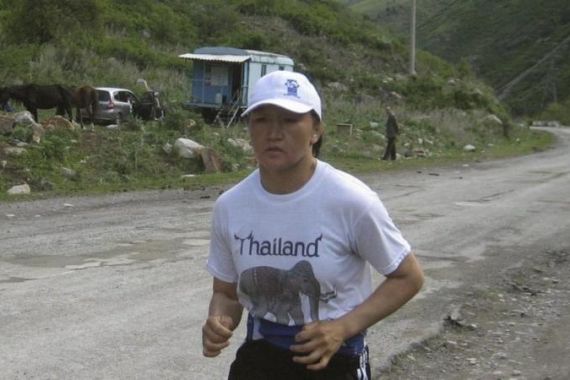Kyrgyzstan’s biggest medal hope
Olympic hopeful Aisuluu Tynybekova runs in the hills and practices with men as she seeks a medal for Kyrgyzstan.

There is not a woman in Kyrgyzstan who can live with Aisuluu Tynybekova on the wrestling mat. Her sparring partners are all male, and at least 10 kg heavier than the Central Asian nation’s best hope of a medal at the London Olympics.
It’s a familiar story for the 19-year-old economics student.
Growing up in her remote mountain village, Tynybekova helped out on the family farm and played basketball with the boys. Her mother, a paediatrician, forbade her from practising karate.
“It wasn’t accepted in the village. There weren’t any sports lessons for girls,” she says.
“I was in the ninth grade (about 15 years old) when I discovered that girls also wrestled.”
Tynybekova was studying in Bishkek, capital of the former Soviet republic, when she was discovered by the former wrestler who is training her for the 2012 Olympic Games.
|
“I have dreamed since childhood of appearing on television, of how I would stand among athletes on the pedestal, with a Aisuluu Tynybekova |
“I met Aisuluu in the university wrestling hall,” said her coach, Nurbek Izabekov.
“I noticed this energetic, pig-tailed girl from the countryside and it was clear to me that she wasn’t wrestling for the first time.
“I saw a savvy, hard-working girl with a huge desire for success.”
Twice a week, Tynybekova takes to the mountains of the Alamedin gorge outside Bishkek, running 10 km through valleys of wild rose bushes more than 1,500 metres above sea level. She drinks kumys, fermented mare’s milk, for inner strength.
She sleeps after lunch, before lifting weights in the evening and sparring in the wrestling hall a stone’s throw from
the apartment she rents on the edge of Bishkek.
In London, she will compete in the 63kg freestyle category.
She trains with men in the 74kg weight category.
“I train with the men because it’s tougher,” she says.
“They are on a different level and I need this for my development. In my weight category, I don’t have a sparring partner in Kyrgyzstan.”
Tynybekova is painfully shy, often avoiding eye contact. She wears a tracksuit top with fluorescent green sleeves, emblazoned with the logo of the 2008 Wrestling World Championship in Tokyo.
“Who wouldn’t want to visit London? But we are not tourists. We are going there with the goal of winning a medal,” she said.
“I have dreamed since childhood of appearing on television, of how I would stand among athletes on the pedestal, with a medal around my neck.”
Coach’s dream
Tynybekova is not the first famous wrestler in her family.
Her maternal grandfather, Akylbek Sulaimanov, was a celebrated practitioner of kuresh, a traditional Central Asian form of wrestling using a belt or girdle to fell an opponent.
Tynybekova’s parents moved to the Naryn region of central Kyrgyzstan a few years after the collapse of the Soviet Union in 1991. Her father, a doctor in Soviet times, returned to his home village to become a farmer.
“We have our own horses. That’s where I go in the summer, to relax. I drink kumys and cow’s milk on the mountain pastures,” she says.
“I’ve even milked the cows myself.”
|
“I’ve taken another three prospective girls under my wing…There is talent here and we will work with it” Tynybekova’s coach Nurbek Izabekov |
She studies the Koran and prays daily. At school, she was inspired by stories of Kurmanjan Datka, a 19th-century Kyrgyz stateswoman who ruled swathes of the southern Alai region and appears today on the country’s 50 som ($1) note.
Her ambition is matched only by that of her coach, Izabekov.
After placing second in Soviet championships, he says he too would have represented Kyrgyzstan in the Olympics had the newly independent country been able to afford to send him.
“I wanted to be a champion, but it didn’t work out. My career coincided with the collapse of the Soviet Union,” he said.
“There was chaos, no money for sport.”
Twenty-one years after independence, Kyrgyzstan is still an impoverished nation with an economy that relies on production from a single gold mine and remittances from migrant workers.
But Izabekov says the situation has improved. The last three years has seen more state financing for sporting facilities.
“My ambition now, as a coach, is to prepare an Olympic champion to fight for a medal,” he said.
One day soon, Tynybekova may also have competition among the women of Kyrgyzstan.
“I’ve taken another three prospective girls under my wing,” said Izabekov.
“There is talent here and we will work with it.”